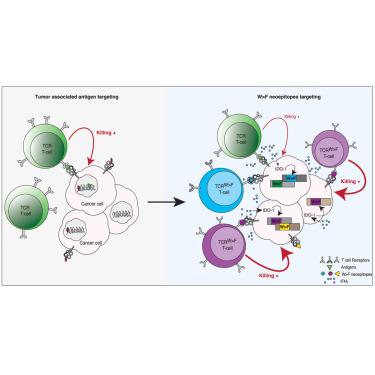Adoptive T cell therapy targeting an inducible and broadly shared product of aberrant mRNA translation
IF 25.5
1区 医学
Q1 IMMUNOLOGY
引用次数: 0
Abstract
Prolonged exposure to interferon-gamma (IFNγ) and the associated increased expression of the enzyme indoleamine 2,3-dioxygenase 1 (IDO1) create an intracellular shortage of tryptophan in the cancer cells, which stimulates ribosomal frameshifting and tryptophan to phenylalanine (W>F) codon reassignments during protein synthesis. Here, we investigated whether such neoepitopes can be useful targets of adoptive T cell therapy. Immunopeptidomic analyses uncovered hundreds of W>F neoepitopes mainly presented by the HLA-A∗24:02 allele. We identified a T cell receptor (TCRTMBIM6W>F.1) possessing high affinity and specificity toward TMBIM6W>F/HLA-A∗24:02, the inducible W>F neoepitope with the broadest expression across cancer cell lines. TCRTMBIM6W>F.1 T cells are activated by tryptophan-depleted cancer cells but not by non-cancer cells. Finally, we provide in vivo proof of concept for clinical application, whereby TCRMART1 T cells promote cancer cell killing by TCRTMBIM6W>F.1 T cells through the generation of W>F neoepitopes. Thus, neoepitopes arising from W>F substitution present shared and highly expressed immunogenic targets with the potential to overcome current limitations in adoptive T cell therapy.

求助全文
约1分钟内获得全文
求助全文
来源期刊

Immunity
医学-免疫学
CiteScore
49.40
自引率
2.20%
发文量
205
审稿时长
6 months
期刊介绍:
Immunity is a publication that focuses on publishing significant advancements in research related to immunology. We encourage the submission of studies that offer groundbreaking immunological discoveries, whether at the molecular, cellular, or whole organism level. Topics of interest encompass a wide range, such as cancer, infectious diseases, neuroimmunology, autoimmune diseases, allergies, mucosal immunity, metabolic diseases, and homeostasis.
 求助内容:
求助内容: 应助结果提醒方式:
应助结果提醒方式:


